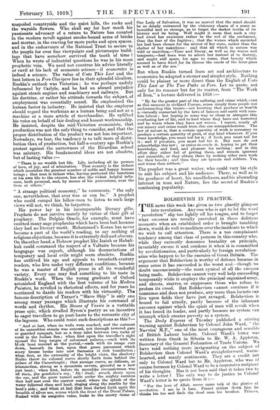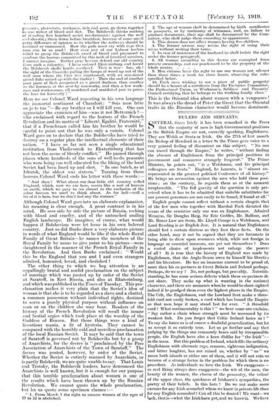BOLSHEVISM IN PRACTICE.
THE news this week has given us two ghastly glimpses into revolution. Any one who is apt to let the word "revolution" slip too lightly off his tongue, and to forget what excesses are usually provoked in those delirious moments when an established order is brought tumbling down, would do well to meditate over the incidents to which we wish to call attention. There is a too complaisant tendency among that class of persons in this country who, while they earnestly denounce brutality on principle, invariably excuse it and condone it when it is committed by revolutionaries, and particularly by foreign revolution. aries who happen to be the enemies of Great Britain. The argument that Bolshevism is worthy of defence because in some sense it has succeeded is the worst and—though no doubt unconsciously—the most cynical of all the excuses being made. Bolshevism cannot very well help succeeding temporarily while it employs the principal organized army, and shoots, starves, or suppresses those who refuse to profess its creed. But Bolshevism cannot continue if it consumes and does not produce, any more than locusts can live upon fields they have just ravaged. Bolshevism is bound, to fail utterly, partly because of the inhuman excesses against which the spirit of man will revolt when it has found its leader, and partly because no system can triumph which creates poverty as a system. The Daily Express of Tuesday published a stirring warning against Bolshevism by Colonel John Ward, " the Navvies' M.P.," one of the most courageous and sensible of British Labour leaders. Colonel Ward's letter was written from Omsk in Siberia to Mr. W. A. Appleton, Secretary of the General Federation of Trade Unions. We have read nothing more invigorating on the subject of Bolshevism than Colonel Ward's straightforward, warm- hearted, and manly sentiments. They are a credit not only to Colonel Ward but to Mr. Appleton, who was of course foreseen by Colonel Ward to be a responsive recipient of his thoughts. Has it not been said that it takes two to write a letter ? The only way to do justice to Colonel Ward's letter is to quote from it:— "For the love of Allah, never more talk of the glories of revolution. I am in it here. Friend strike; down him he thinks his foe end finds the dead man his brother. Princes,
peasants, plutocrats, workmen, rich and poor, go down together
m one welter of blood and dirt. The Bolshevik thinks nothing of standing five hundred social revolutionists against the well and shooting them down before breakfast, because of sonic small petty difference of opinion as to whether the railways should be national or communal. How the gods must cry with rage that men can be so mad ! How ever any of our Labour leaders failed to grasp the Bolshevik creed of blood and presumed to condone the horrors committed by this mob of fanatical maniacs.
I cannot imagine. Rather pray heaven defend our old country from such a calamity. I have entered Ekaterinburg and heard the Bolshevik shells hurtle overhead. That is war : but, oh ! the sight of the Cossacks pulling the lumps of wood up out of the well near where the Czar was imprisoned, with as occasional grand duke mixed up with the timber ! Then the end of another poor piece of flesh recognized as is grand duchess, then another ns the foreman at the near-by ironworks, and then a few work- men and workwomen. all murdered and mutilated just to prove the love for humanity ! "
Here we see Colonel Ward repeating in his own language the immortal sentiment of Chamfort: " Sois mon h&c on jo to tue "—Be my brother or I will kill you. One can appreciate the cynicism of him—was it not Metternich ?— who exclaimed with regard to the horrors of the French Revolution and its motto of " LibertC, Egalite, Fraternite," that if a Frenchman called him his brother he would be careful to point out that he was only a cousin. Colonel Ward goes on to declare that the Bolsheviks have tried to destroy on a regular plan the intellectual elements of their nation. " I have so far not seen a single educational institution from Vladivostok to Ekaterinburg that has not been the scene of bloody conflict." He passed through places where hundreds of the sons of well-to-do peasants who were being too well educated for the liking of the local Soviet had been lined up and shot. " In one batch, as at Irkutsk, the oldest was sixteen." Turning from those horrors, Colonel Ward ends his letter with these words:
" And then ! What about our dear little old country called England, which, now we are here, seems like a sort of heaven on earth, which we pray to see almost to the exclusion of the other heaven we used to think about. As for hell—well a bit of it is here, but we don't feel any the warmer."
Although Colonel Ward goes into no elaborate explanation, his meaning is clear enough. A great contrast is in his mind. He sees side by side the picture of Russia, reeking with blood and cruelty, and of the untouched smiling English landscape. He imagines, of course, what would happen if Bolshevism were let loose in his own beloved country. Just so did Burke draw a very elaborate picture in words of what England would be like if the whole Royal Family of Great Britain—he names the members of the Royal Family by name to give point to his picture—were slaughtered in the manner of the French Royal Family in the Revolution. And then Burke exclaimed : " Would this be the England that you and I and even strangers admired, honoured, loved, and cherished ?
The other thing to which we beg attention is an appallingly brutal and sordid proclamation on the subject of marriage which was posted up by order of the Soviet at Saratoff, in East Russia, and also at Ekaterinburg, and which was published in the Tittles of Tuesday. This pro- clamation makes it very plain that the Soviet's idea of woman is that she is to be regarded as a slave and a chattel, a common possession without individual rights, destined to serve a purely physical purpose without influence on titan or on the children she may bear. Readers of the history of the French Revolution will recall the insane and bestial orgies which took place at the worship of the Goddess of Reason. But those things were a kind of licentious mania, a fit of hysteria. They cannot be compared with the horribly cold and merciless proclamation of the local Russian Soviet. It may be said that the town of Saratoff is governed not by Bolsheviks but by a group of Anarchists, for the decree is " proclaimed by the Free Association of Anarchists of the Town of Saratoff." The decree was posted, however, by order of the Soviet. Whether the Soviet is entirely manned by Anarchists, or is partly Bolshevik, we are quite unable to say. That Lenin. and Trotsky, the Bolshevik leaders, have denounced the Anarchists is well known, but it is enough for our purpose
that this terrible proclamation about women is one of
the results which have been thrown up by the Russian Revolution. We cannot quote the whole proclamation, but let us quote some specimen clauses :- " 1. From Minch I the right to Pewees women of the ages of 17 to 32 is abolished.
2. The age of women phial be determined by birth certificates or passports, or by testimony of witnesses, and, on failure to produce documents, their age shall he determined by the Com- mittee. who shall judge them according to appearance. 3. This decree does not affect womea having five children. 4. The former owners may retain the right of using their wives without waiting their turns. 5. In case of resistance of the husband he shall forfeit the right under the former paragraph. 6. All women according to this decree are exempted from private ownership, and are proclaimed to be the property of the whole nation. . . . .
9. Men citizen, have the right to use one woman not oftener than three times a week for. three hours, observing the rules specified below.
10. Each malt wishing to use a piece of public property should be a bearer of a certificate from the Factories Committee. the Professional Union. or Workmen's. Soldiers and Peasants' Council certifying that he belongs to the working family class."
This is the Oriental idea about women with a vengeance!! It was always the dread of Peter the Great that the Oriental traits in the Russian character would become dominant.



































 Previous page
Previous page